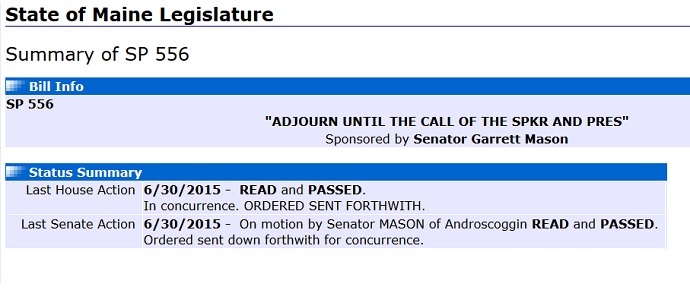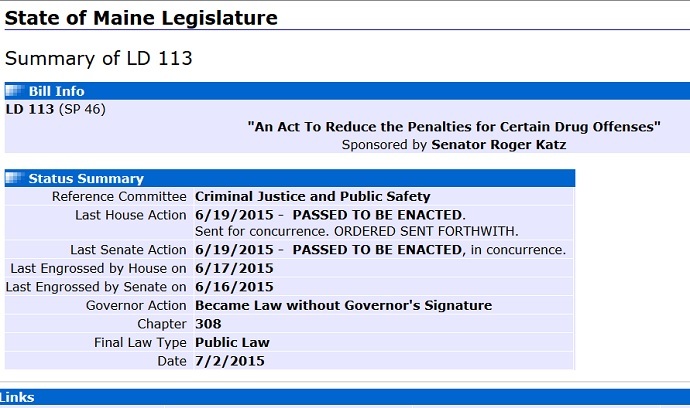That’s not how it works: Maine gov. accidentally enacts laws he meant to veto

Maine’s legislature is channeling its inner Inigo Montoya, telling the governor that “adjourn” does not mean what he thinks it means. Nearly 20 new bills became law because he tried using his pocket veto powers while lawmakers were still in session.
Governor Paul LePage (R-Maine) claims to have used a “pocket veto” to prevent 19 bills ‒ several of which he vehemently opposed ‒ from becoming law in an attempt to toy with the legislature. Under the state’s constitution, a pocket veto nullifies a bill 10 days (excluding Sundays) after it is passed, even without the governor’s signature ‒ but only when the legislature is out of session.
After final passage (enactment) the bill is sent to the Governor.
The Governor has ten days in which to sign or veto the bill.
If the Governor does not sign the bill and the Legislature is still in session, the bill after ten days becomes law as if the Governor signed it.
If the Legislature has adjourned for the year the bill does not become law.
This is called a "pocket veto."
If the Legislature comes back into special session, the Governor on the 4th day
must deliver a veto message to the chamber of origin or the bill becomes law.
-Maine’s Path of Legislation
There’s only one problem with LePage’s plan: Lawmakers say they haven’t actually adjourned the session. Instead, they are on recess until July 16, meaning that the 19 bills have now become law. LePage, however, points to the wording of a joint order passed June 30 that reads, “Pursuant to Joint Order S.P. 556, the Senate and House are adjourning until the call of the President of the Senate and the Speaker of the House, respectively, when there is a need to conduct business, or consider possible objections of the Governor.”

Clerk of the Maine House Robert Hunt told the Portland Press Herald that the two legislative chambers use the word “adjourn” in the context of a temporary recess and routinely pass “adjournment orders” – similar to the one adopted on June 30 – when lawmakers leave town for several days. The House ends each legislative work day by saying that “the House stands adjourned” until the specified return date, he added.
“We have adjourned multiple times and multiple times there have been vetoes presented to us that we have considered. So what has changed?” Hunt said. “It’s my interpretation that the 10 days have lapsed on these [bills] and we are still in session.”
Hunt pointed to a publication by the American Bar Association called ‘Sutherland Statutes and Statutory Construction’, an authoritative text on statutes, to define the word “adjourn.”
“The term ‘adjournment’ as used in the constitutional provisions is generally held to relate to final adjournment rather than temporary adjournment or recess,” the publication says. “Thus, a return of a bill after a temporary recess does not prevent the bill from becoming law.”
Maine’s Revisor of Statutes Suzanne Gresser agreed, telling the Bangor Daily News on Tuesday that the 19 bills had not been returned to her office by LePage after the 10-day timeframe for him to veto or sign the approved legislation. Because LePage didn’t any action, the bills should have returned to Gresser to go through the official process for becoming law, she said.
“The governor’s office has not contacted us or asked us to do anything differently than what we have been doing, nor has any legislative office,” Gresser told the Portland Press Herald.
"Frankly, if he returns them to me, I don't know what I’ll do," Hunt said to TPM.
LePage disagreed, however.
“I vetoed the bills,” LePage told reporters Wednesday, according to the Maine Public Broadcasting Network. “They’re all vetoed. They need to be here for four days before [lawmakers] can act on them.”
LePage said he will “try to force” the legislature if it insists the bills have become law.
“We’ll go to the courts and we’ll ask them,” the governor said. “It’s in the [Maine] Constitution… It’s very clear – very, very clear. Even I can understand it, and I’m French.”
Despite LePage’s remarks, the Revisor of Statutes Office – the nonpartisan legislative office that drafts bills and writes statutory language – began writing the 19 bills into law on Wednesday, although most will not take effect for 90 days, Gresser told the Portland Press Herald.
Both chambers were deliberate as to when they passed the 19 bills, as tensions have run high between the executive and legislative branches of the Maine government. By mid-June, LePage had vetoed about 200 items ‒ many using his line-item veto powers ‒ during this legislative session, including every bill sponsored by Democrats. He said he wanted to jam up the legislative process by requiring hundreds of votes to override his vetoes, according to the Bangor Daily News.
“I want to show that for five months they wasted our time and this time I’m going to waste a little of their time,” LePage said at the time.
Democratic legislators crowed over the seeming error by the governor.
“I can’t even process this right now, that this is his latest move,” House Majority Leader Jeff McCabe (D) told the Bangor Daily News. “It’s very clear, as far as the role the governor has, when it comes to bills ‒ whether he signs them, not signs them or vetoes them. To hold them for an arbitrary period of time doesn’t really work. He can’t rewrite the rules.”
“We were expecting him to act on these last Thursday when he was hanging out with [Republican presidential candidate and New Jersey Gov.] Chris Christie, but he seems to have gotten distracted by that,” McCabe added.
Even fellow Republicans were dismayed by the turn of events. Lance Dutson, a longtime Republican strategist and consultant, told the Portland Press Herald, that LePage has increasingly alienated himself from Republicans by “instituting a culture of fear and retribution.”
“It’s really kind of unexplainable,” Dutson said. “I can’t imagine that this is anything but a major screw-up on the part of the administration. And their explanation today is absurd.”
@riocarmine Thanks to the gov's screw up, asylum seekers will now receive GA. Love to see the base's reaction to this. #mepolitics
— Lance Dutson (@ldutson) July 7, 2015
Among the bills that are set to become law thanks to LePage’s failed pocket veto is one that extends financial assistance to refugees and asylum seekers, who normally cannot receive US work permits. LePage previously called the bill “illegal alien welfare,” the Bangor Daily News reported.













